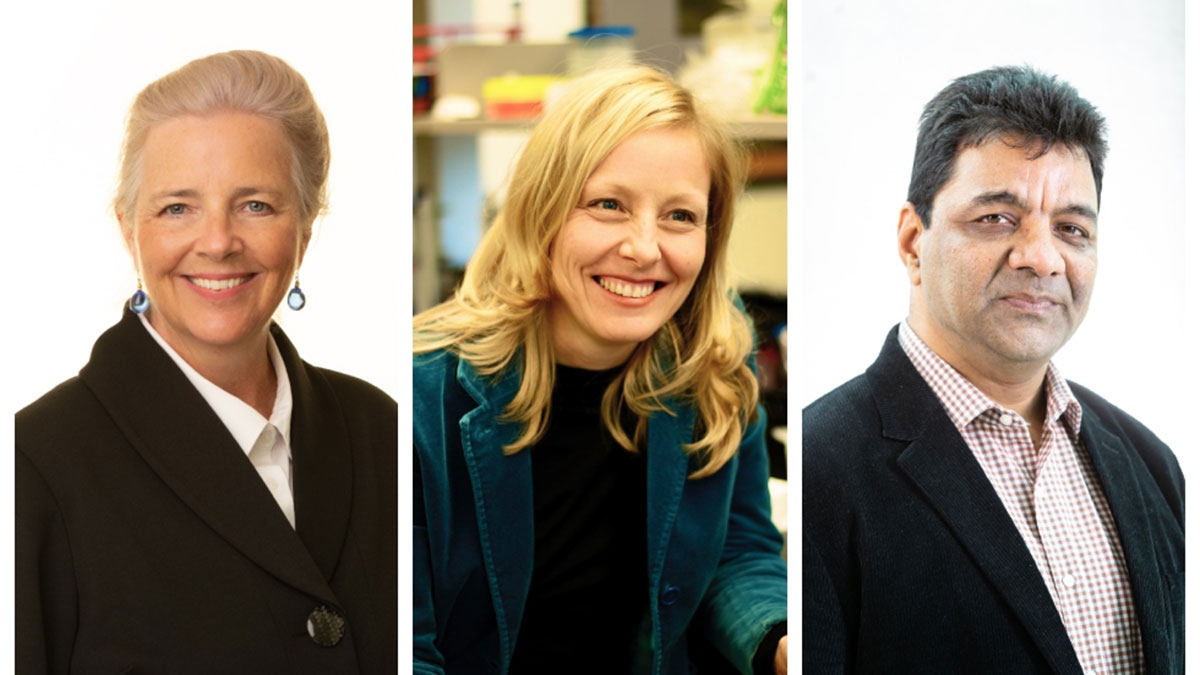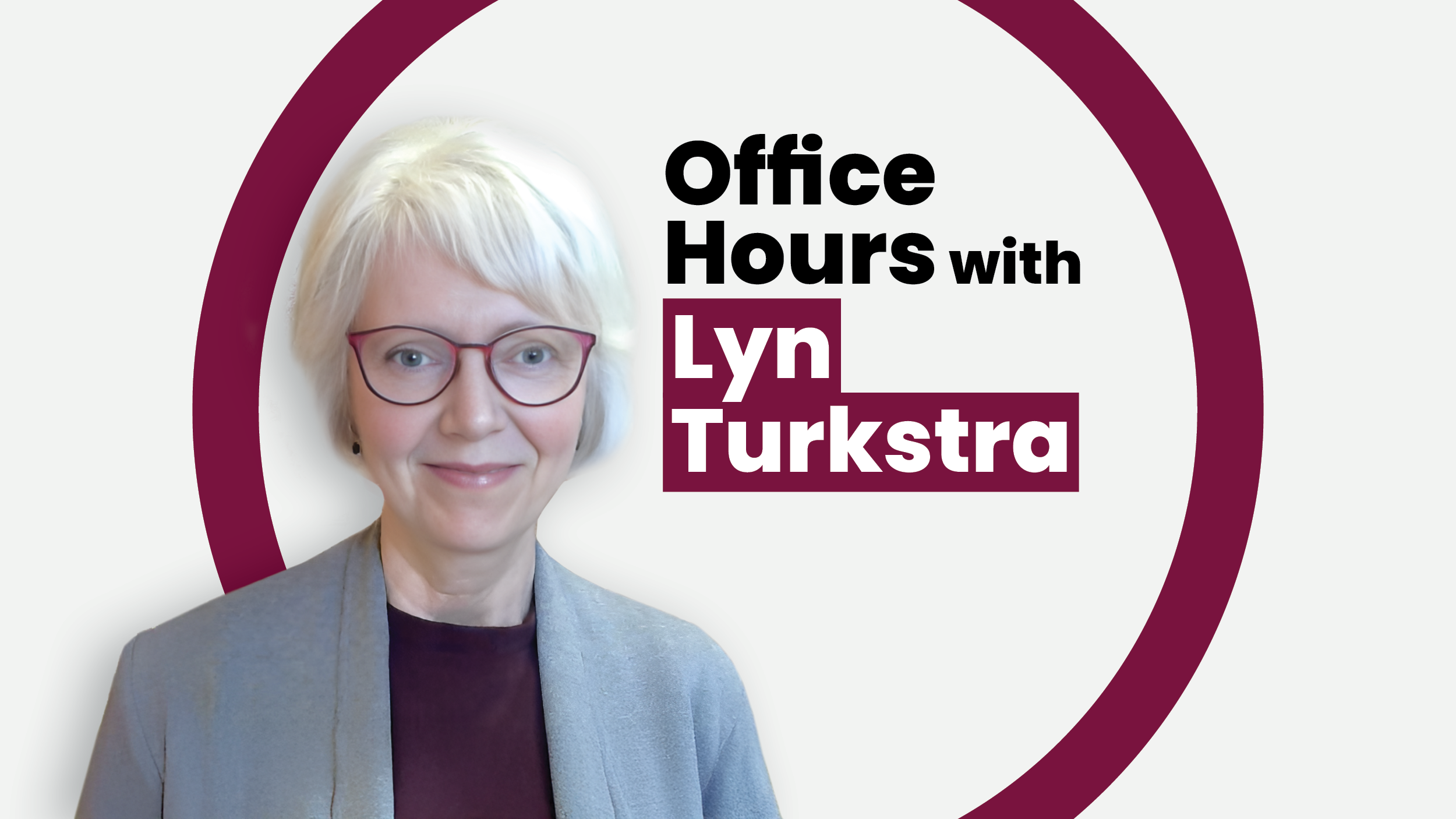Office Hours with Amanda Bell

If you asked Amanda Bell to describe herself, you’d learn a lot about her.
You’d learn she’s a clinical professor and the regional assistant dean of McMaster University’s Niagara Regional Campus (NRC). You’d also learn that she’s as selfless as they come, and that her passion for helping and healing her community is the driving force of her career.
“At the heart of things, I’m a mom, wife, and friend. I’m a small-town family doctor. And I’m an advocate and ally for learners and faculty working in our region,” she says.
Small town pride
Bell’s journey to being “a proud, small-town family doctor” came as a surprise – she grew up in the heart of Ottawa and pursued most of her higher education at McMaster. While completing her undergraduate degree in Arts & Science, she planned to go to law school.
“I realized I was most interested in the stories of people in medicine, ethics, and law. And I thought if I just want to keep reading the case stories, then I probably should go into something where I get to deal with the people who are living the case stories.”
That’s how she found her way to McMaster’s School of Medicine, where she’s now a leader.
“It was the perfect program for me, and it was really foundational to who I’ve become,” she says. “The relationships with patients were important to me. I needed to know their stories – where they came from and who they are in the context of their families and their environment.”
She moved back home to Ottawa for her residency, where she was one of the first rural family medicine residents with the University of Ottawa.
“In training in a small town, I saw the ability of individual physicians to not only impact patients, but the health of a community,” she says. During that time, she gained skills, knowledge, confidence, and a husband.
“While I was in residency, I fell in love with a boy from Niagara. He was a teacher there, so we had a long-distance relationship. And when I finished residency, I had the opportunity to work anywhere, so I came down to Niagara 24 years ago and haven’t left.”
For 17 years, Bell operated a family medicine practice in Port Colborne where she established trust with her patients – an undertaking made easier by her presence in the community.
“By being in a small town it meant that my patients were also the people that I saw at the bank, the grocery store, and on the basketball court when my kids were playing. There was a true sense of relationship and trust and community in that,” she says.
“My patients saw me as a real, three-dimensional person. When we were dealing with their challenges and struggles, when there was bad news, when there was good news – there was a depth of relationship and a strong sense of connection, understanding, and community. I didn’t have to be the smartest or the fastest or have all the answers, I just had to be present with them along their journey. And they were confident in me because they knew me – I was rooted in the community,” she adds.
An opportunity to change things
Bell’s desire to incorporate teaching into her practice was inspired by the influence of clinical teachers throughout her own training. She began teaching clinically in her practice before being a problem-based learning tutor.
“I could be somebody that was going to show learners that I loved what I did, and I was able to balance my life in medicine and outside of medicine in a way that I thought was meaningful,” she says.
At that time, NRC was getting off the ground and Bell started working with the program in their pre-clerkship curriculum before moving on to roles in Student Affairs. The turning point in her career came when the regional assistant dean position became available, which meant she would give up her family practice and shift from mostly clinical work to mostly administrative.
“It was a big decision, but in my way of looking at things, I could influence and impact my small patient population directly by staying in clinical work; but if I moved into medical education leadership, I could impact that number of new physicians in their training every year and they would go out in turn and impact their patient populations. So, from a public health point of view, I actually had a lot more opportunity to change things. I could shape what medical training in Niagara felt like.”
Bell has led NRC – which was established in 2008 – for the past seven years. It’s a place that Bell says has a real “family-feel.” Hundreds of students train in 11 communities across the Niagara region and learn from over 450 faculty members who represent all 12 Health Sciences Departments.
“It’s important for the Hamilton-based folks to understand that the McMaster footprint is so much wider than just Hamilton, and there are so many exceptional teaching and learning opportunities beyond the borders of the city of Hamilton.”
Shaping the next generation of physicians
Through locum arrangements, Bell still treats patients – in the practice of one of her supervisors from her own residency many years ago – but her focus on shaping the next generation of physicians is rewarding work that she says gives her purpose.
“I really have a soft spot for early learners, so I like encountering them early in their journey and seeing how we can impact their path.”
At the heart of why Bell has pursued leadership is her interest in social justice in medical education. When she was chair of Student Affairs across the Undergraduate Medical Education Program, she recalls how students would approach her with difficult experiences.
“Very few of them had or wanted to report those experiences, and so there was this mismatch between the lived experience of learners and the ability of the institution to change things. If we don’t know where it’s happening, we can’t address it. We can’t fix it.”
Bell understands she can bridge that gap and remove barriers in her role as regional assistant dean. Early in her tenure, she pursued a Master’s of Health Science Education at McMaster and focused her thesis on medical student mistreatment.
“I feel a responsibility to ensure a positive experience for learners and faculty, and to support all those groups as they intersect in medical education. I want to make learning in Niagara a positive and supportive experience,” she says.
Listening to students and faculty has resulted in a more inclusive environment – which Bell considers a cornerstone of her leadership approach. Under her, NRC has introduced a multifaith room, access to pronoun pins, and has focused on training in Indigenous reconciliation.
“If a learner doesn’t see themselves reflected in their physical environment, they don’t believe they belong. We must reflect on the experiences they’re having, how can we support them, and how we can empower them to become happy, healthy, and high-functioning physicians as they enter the next stage of their career.”
Dept. FamMed, Faculty & Staff, Office HoursRelated News
News Listing

2 days ago


